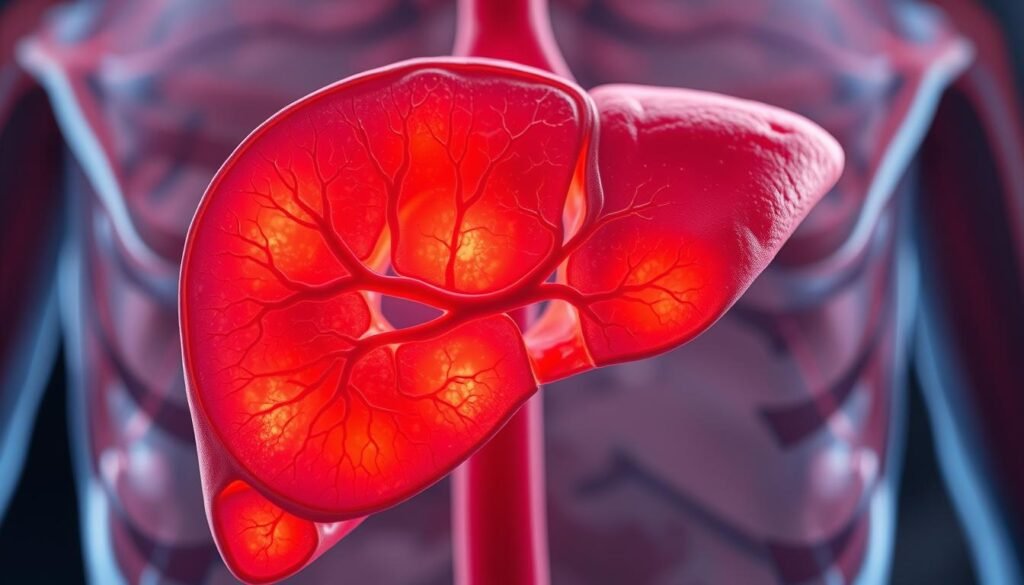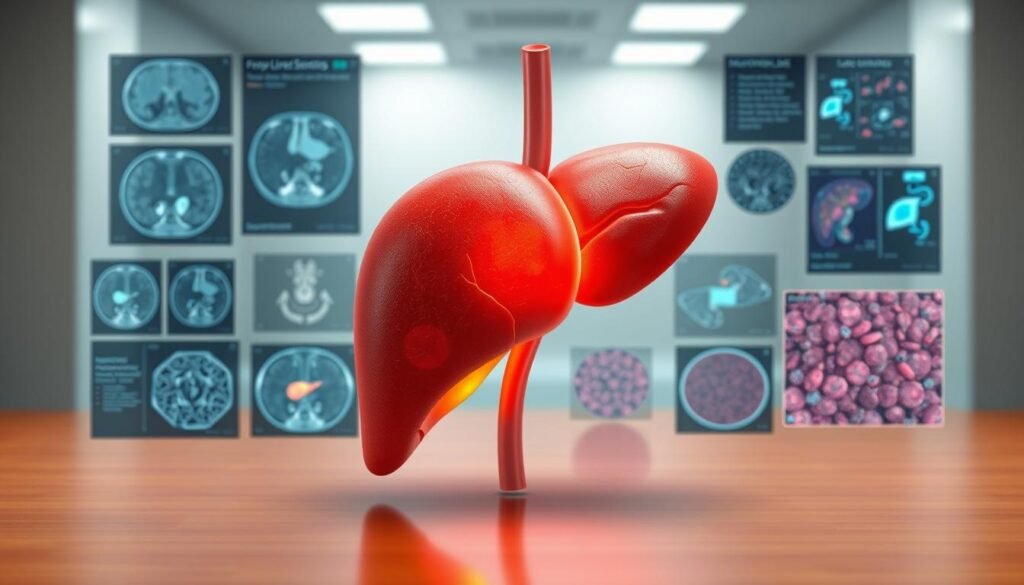
We understand the worry that comes with a diagnosis or a late-night search for answers. We have seen how a single test result can change the way patients and families think about food, work, and the future. Our goal is to turn that worry into clear steps and real hope.
We explain how the liver converts food to energy, creates bile for digestion, and removes toxins. Those tasks keep us moving each day, and protecting this organ underpins lifelong health. We draw on current research and clinical experience to offer practical, evidence-based guidance.
We outline risks like metabolic factors and viral infection so we can personalize care plans for patients at every stage of disease. Our services range from prevention and counseling to advanced diagnostics and treatments. Ahead, we will detail our team, the conditions we treat, cutting-edge procedures, and how we evaluate supplements like HepatoBurn responsibly.
Early engagement improves outcomes. We connect science to the bedside and invite you to reach out with questions as you explore your liver care options.
Key Takeaways
- We offer evidence-based guidance grounded in current research and multidisciplinary practice.
- The liver supports energy, digestion, and detoxification—protecting it matters for lifelong health.
- We assess risk factors to tailor care plans for patients at different stages of liver disease.
- Services span prevention through advanced treatment, ensuring timely, right-sized care.
- We evaluate supplements like HepatoBurn responsibly, translating research into practical steps.
- Early engagement and clear questions help improve outcomes and patient confidence.

Expert hepatology services tailored to your liver health
Our clinic bundles diagnostics and specialists so each patient gets a clear, personalized care plan.
We begin with targeted tests that avoid duplication and focus on what informs treatment and management. This approach shortens the time from evaluation to effective care.
Care is coordinated by hepatologists, gastroenterologists, transplant surgeons, interventional radiologists, pathologists, oncologists, pharmacists, and nurse navigators. Together we streamline appointments so patients see the right specialist at the right time.
- We tailor treatment to diagnosis and goals, combining medication, nutrition, and procedure planning.
- We offer second opinions that reassess prior tests and refine staging for clearer management paths.
- We integrate noninvasive testing, imaging, and labs to minimize risk while gathering needed clinical detail.
We align our plans with national guidelines and emerging evidence so patients and families can make informed choices about therapies and long-term care. Ahead, we will review supplements like HepatoBurn and offer safe, evidence-based alternatives for treating liver disease.
Our hepatology team and multidisciplinary care model
Our clinical team works together to turn complex liver problems into clear, actionable care plans. We combine specialists so patients move from tests to treatment without unnecessary delay.
Who we are
We staff hepatologists, gastroenterologists, transplant surgeons, oncologists, interventional radiologists, pathologists, pharmacists, and nurse navigators. This structure keeps coordination tight and patient navigation simple.

Coordinated care for complex cases
We provide rapid second opinions and multidisciplinary conferences to decide when surgery or nonsurgical options work best. Our team aligns around a single plan so patients know what to expect at each step.
Comprehensive diagnostics and monitoring
We base diagnosis on targeted blood tests, high-resolution imaging, and image-guided biopsy when needed.
- Advanced tumor assessment for suspected hepatocellular carcinoma ensures imaging and pathology agree before treatment.
- We track cirrhosis with standardized scores and surveillance intervals to act early on complications.
“Coordinated care reduces delays and improves outcomes for people with liver disease.”
We also ensure our team-based evaluations inform safe recommendations later in our HepatoBurn review. Ongoing communication after surgery or procedures keeps follow-up tests and medications on track.
Liver diseases we diagnose and treat
Our team evaluates common and rare liver conditions, prioritizing early detection and clear treatment paths.
Fatty liver disease and steatohepatitis
We assess the full spectrum from simple fatty liver to steatohepatitis with scarring. Obesity and diabetes raise the risk of progression, so we pair metabolic care with targeted monitoring.
Lifestyle change — weight loss, glucose control, and lipid management — is central to slowing fibrosis and lowering future cancer risk.
Viral hepatitis (B and C)
Chronic hepatitis B and C can progress to cirrhosis and hepatocellular carcinoma if untreated. We use antiviral therapy and structured surveillance to reduce long-term cancer risk.
Alcohol-related and autoimmune conditions
We offer structured counseling and medical support for alcohol-related injury and screen for overlapping fatty liver.
Autoimmune and cholestatic disorders, like primary biliary cholangitis, cause bile duct damage that needs specialist management and long-term follow-up.
Cirrhosis and its complications
We stage cirrhosis carefully and anticipate complications such as portal hypertension, ascites, and encephalopathy. Early intervention lowers the risk of variceal bleeding and failure.

“Care that identifies risk early and links patients to evidence-based treatment prevents complications and improves outcomes.”
| Condition | Key risks | Main approach | Surveillance |
|---|---|---|---|
| Fatty liver / steatohepatitis | Obesity, diabetes, metabolic syndrome | Lifestyle, metabolic control, fibrosis assessment | Imaging and labs based on fibrosis stage |
| Hepatitis B & C | Chronic infection, cirrhosis, cancer | Antivirals, viral suppression | HCC surveillance with imaging and markers |
| Alcohol / Autoimmune | Alcohol use, immune-mediated bile injury | Abstinence programs, immunotherapy when indicated | Targeted labs and imaging |
| Cirrhosis & complications | Portal hypertension, ascites, encephalopathy | Prevention, diuretics, endoscopy, transplant referral | Regular surveillance for hepatocellular carcinoma |
We take an evidence-first lens to conditions often targeted by supplements. When supplements promise benefit, we prioritize tests and proven therapies and explain where lifestyle change matters most.
Advanced treatments, procedures, and surgery</H2::
Our approach to advanced liver problems pairs lifestyle-focused management with modern interventional and surgical therapies. We emphasize options backed by evidence and explain choices in clear terms so patients understand benefits and risk.
Medication and lifestyle management
We start with medication and structured lifestyle change. A low-sodium diet helps control ascites and edema.
We also manage diabetes, obesity, and lipids to slow fibrosis and lower the chance of disease progression.
Interventional therapies
For focal tumors, we offer radiofrequency ablation and other minimally invasive procedures. These therapies reduce recovery time and limit tissue injury.
Liver transplantation and surgical options
We plan surgery with organ-sparing techniques when possible and outline expected hospital stay and rehab. When failure progresses despite optimal management, we evaluate candidates for liver transplantation and coordinate listing and bridging therapies.
- Standardized cirrhosis pathways: diuretics, beta-blockers, and surveillance for hepatocellular carcinoma.
- Integrated alcohol counseling and bile symptom care to improve outcomes.
- Plain-language reviews of procedure-specific risks and follow-up testing.
“We favor proven treatments over unproven supplements and preview our HepatoBurn review to guide safe choices.”
HepatoBurn Review and evidence-based liver health guidance
Our review compares HepatoBurn’s advertising with peer-reviewed research to help patients make safe choices. We contrast marketing claims with clinical data and explain realistic steps for improving liver health.
What HepatoBurn claims versus what research supports
HepatoBurn promotes rapid fat loss and a liver “detox.” Current research shows that sustained improvement in fatty liver disease and steatohepatitis comes from weight loss, exercise, and targeted medical care. Clin Mol Hepatol (2025) and major centers like University of Michigan stress controlling diabetes and obesity over quick-fix supplements.

Our guidance: safe alternatives and proven treatments
We recommend baseline tests—liver enzymes, noninvasive fibrosis assessments, and imaging—before starting any product. Bring supplement labels to appointments so we can check dosing, interactions, and known hepatotoxic ingredients.
- Prioritize gradual weight loss, personalized nutrition, and structured activity.
- Manage diabetes and lipids to reduce long-term risk and protect liver cells.
- Consider evidence-based programs, dietitian referral, or medications when criteria are met.
“Stop nonprescribed supplements and seek evaluation if symptoms or labs worsen.”
Clinical trials and research in hepatology
We link eligible patients to studies that explore early detection and better treatments for liver cancer and related disorders.
Current focus areas include hepatitis B and C, fatty liver disease, drug-induced injury, and hepatocellular carcinoma.
Our faculty partner with networks that study biomarkers for early hepatocellular carcinoma, acute liver events, antiviral strategies, and antifibrotic therapies. These efforts turn data into care improvements.
How we connect patients to studies
During routine visits we screen for trial eligibility and match criteria so interested patients can consider participation.
- Education and consent: We explain risks, schedules, and monitoring in plain language.
- Coordination: Scheduling and safety checks are handled to reduce burden on patients and primary teams.
- Safety oversight: We track adverse events closely, with attention to infection and acute liver injury.
“Trials may offer access to novel therapies and diagnostics that outperform unproven supplements, while preserving high-quality standard care.”
We share validated findings when allowed and fold proven advances into practice, so research benefits patients both inside and outside trials.
Conclusion
Our final note: our team works with patients to turn testing into clear treatment steps and ongoing care. We guide evaluation, imaging, and labs so decisions about treating liver conditions feel manageable and evidence based.
Early engagement improves outcomes across liver disease. We prioritize prevention, medical therapy, and timely surgery when needed to lower the risk of failure, hospitalization, or liver cancer.
We urge patients to choose proven strategies over unproven supplements. Use our HepatoBurn Review as a practical checklist and bring products to visits so we can assess safety and interactions.
Contact us for a second opinion or to begin coordinated care. Simple habits that support bile flow and metabolic health, paired with our team’s follow-up, protect long-term liver function.

FAQ
What services do we offer for liver health?
We provide comprehensive care including diagnosis, medical management, interventional procedures, and surgical options. Our services cover blood tests, imaging, biopsy, tumor assessment, medication and lifestyle counseling, minimally invasive therapies, and liver transplantation when needed.
Who is on our hepatology care team?
Our team includes hepatologists, gastroenterologists, transplant surgeons, oncologists, radiologists, pathologists, pharmacists, and nurse navigators. We work together to create coordinated plans for complex liver disease, second opinions, and surgical care.
How do we diagnose fatty liver disease and steatohepatitis?
Diagnosis uses a combination of clinical history, labs, imaging such as ultrasound or MRI, and sometimes biopsy. We assess metabolic risk factors like obesity and diabetes, evaluate liver scarring risk, and stage disease to guide treatment choices.
What treatment options exist for fatty liver disease?
We recommend lifestyle measures—weight loss, diet, and exercise—plus management of diabetes and lipids. When appropriate, we use evidence-based medications or refer patients to clinical trials. We monitor progression to steatohepatitis and cirrhosis closely.
How do we manage viral hepatitis B and C?
We offer testing, antiviral therapies, and long-term monitoring for cirrhosis and liver cancer risk. For hepatitis C, highly effective direct-acting antivirals can cure most patients. For hepatitis B, we provide antiviral suppression and surveillance strategies.
What care do we provide for alcohol-related and autoimmune liver diseases?
Care includes medical treatment to control inflammation, counseling for alcohol cessation, immunosuppressive therapy when indicated, and close follow-up for complications. We tailor plans to disease severity and comorbid conditions.
How do we treat cirrhosis and its complications?
We manage portal hypertension, ascites, and hepatic encephalopathy with dietary guidance, medications, procedures like paracentesis, endoscopic therapy for varices, and evaluation for liver transplantation if disease is advanced.
When is liver transplant considered?
Transplant is for end-stage liver disease or some liver cancers when other treatments fail. We perform thorough evaluation, list eligible patients, and coordinate surgical and post-transplant care with transplant surgeons and support teams.
What interventional therapies do we offer for liver tumors?
Our programs include radiofrequency ablation, transarterial therapies, and image-guided, minimally invasive procedures. We select therapies based on tumor size, location, liver function, and overall patient health.
How do we evaluate supplements like HepatoBurn?
We review claims against current clinical evidence. If a product lacks rigorous research or safety data, we recommend proven alternatives, medical evaluation, and proven interventions for fatty liver. We prioritize patient safety and efficacy.
How can patients join clinical trials with us?
We screen patients for eligibility in studies for hepatitis, fatty liver disease, drug-induced injury, and liver cancer. Our research coordinators connect eligible patients to trials and explain risks, benefits, and requirements.
What lifestyle changes help protect the liver?
We advise weight loss when needed, a balanced low-sodium diet for cirrhosis, alcohol avoidance, regular exercise, and control of diabetes and high cholesterol. These changes reduce progression risk and improve overall outcomes.
How do we monitor patients at risk for liver cancer?
We use regular surveillance with ultrasound and blood tests such as AFP for patients with cirrhosis or chronic viral hepatitis. Surveillance frequency follows established guidelines to detect tumors early when treatment is most effective.
When should someone seek a specialist for liver symptoms?
Seek specialist care for persistent fatigue, jaundice, abdominal pain, unexplained weight loss, abnormal liver tests, or if you have known liver disease. Early evaluation helps prevent progression and enables timely treatment.